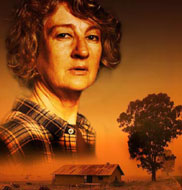The Good Shepherd
 Clover (Angelina Jolie) and Edward Wilson (Matt Damon) meet for the first time in The Good Shepherd. They will go on to get married and create a family which Wilson moves further and further away from as the formation of the CIA dominates his life.
Clover (Angelina Jolie) and Edward Wilson (Matt Damon) meet for the first time in The Good Shepherd. They will go on to get married and create a family which Wilson moves further and further away from as the formation of the CIA dominates his life.It is in the earliest scenes that the film is at its strongest; the Yale days and then those in World War Two are the most interesting, if only because they seem more human, and Wilson is a more likeable characters - provided the perfect foil in the gay, plagiarising poetry professor who becomes his mentor (played superbly by Michael Gambon). It is in the fall of Berlin that he meets his nemesis for the remainder of the film, codenamed Ulysses, and the film goes on to chronicle the early years of the Cold War. It cuts back and forth from the 'present' of 1961 as Wilson investigates the leak of the details of the landings at the Bay of Pigs, and it is this investigation that necessitates the 45-minute coda to the film as he chases his answer across the world. The film has some moments of absolutely lyrical beauty (a wedding veil in the wind for example) and others of undeniable power, but is plagued too with problems only amplified by its length. The casting is one: Matt Damon is not 45, no matter how dowdy a cardigan he wears, and Angelina Jolie (in a tragically underwritten role) is similarly troubled. In fact, most of the more interesting characters remain on the periphery and some even disappear without a trace at the expense of other, less interesting ones. This is true in the case of Damon and Jolie's son who, quite apart from being boring, gullible and irritating, is fairly atrociously played by Eddie Redmayne. (It seems there are no decent actors in their 20s currently working: first Ben Whishaw, now him, who is next to disgrace themselves on screen?). He overbalances two moments which are absolutely integral to the latter part of the film and had the potential to be affecting and moving, but now just fall a bit flat. It is left to Damon to rescue to film, which he does to an extent with an ending which gives a sense of the tragic to the way his life has been lived - but you can't help wondering how much he brought upon himself. Despite being a foundational member of the CIA, he's not Jason Bourne: he's not presented as a particularly good spy (intentionally or otherwise), which is worsened by the fact his Russian opposite number seems a lot better.
There is a feeling with this film that is has come of some magnificent material and has some genuinely excellent moments, but in the final edition as it is there is too much extraneous material to make it a truly great film. Long films can be magnificent ones (The Godfather, Magnolia) but this one lags too much at times, is the victim of its own structure, and in the end is not as moving as it would like to be (much like Lord of the Rings: Return of the King). Production is flawless (particular nod to editor Tariq Anwar), direction and acting fine and script well done: The Good Shepherd just somehow fails to come together in the end. (De Niro has suggested there is a possible trilogy in development of the life of spy Edward Wilson to the fall of the Berlin Wall and beyond; perhaps it is there this film will cohere).














